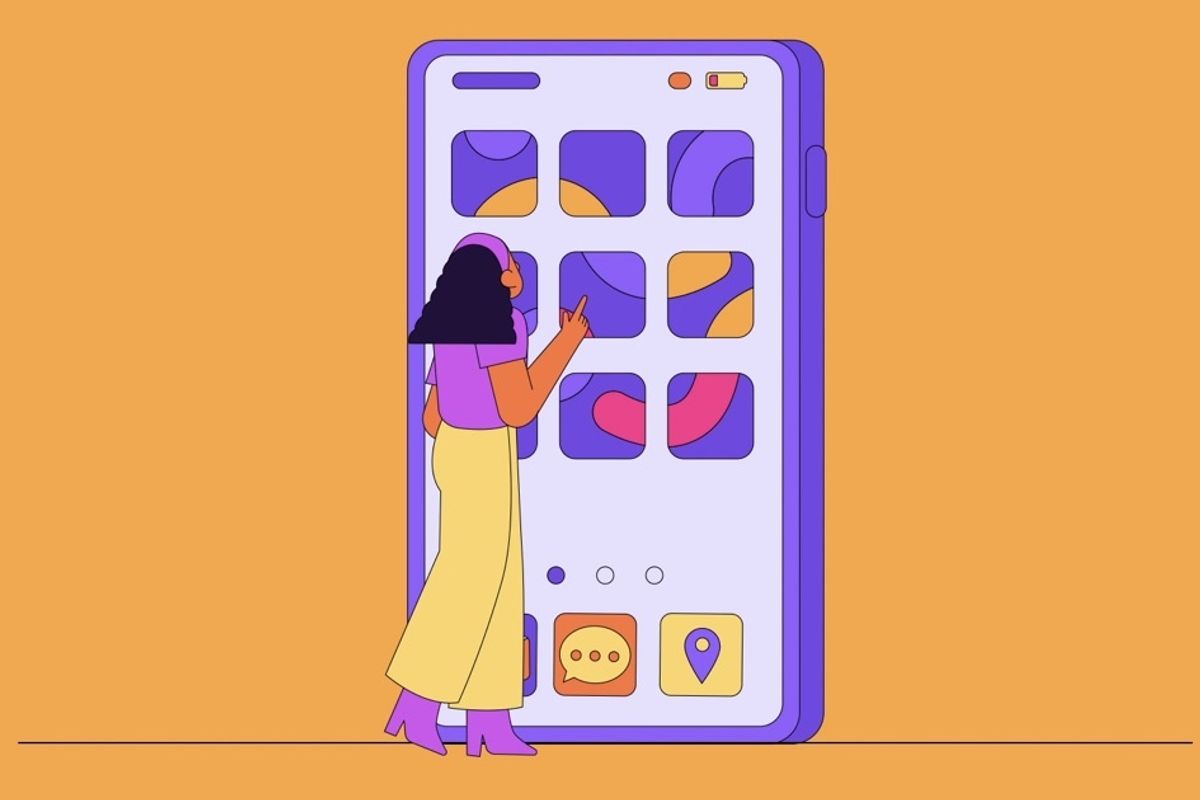No, your phone isn’t ‘listening’ to you — but it’s probably tracking you

When I found out I was pregnant in October 2018, I had planned to keep the news a secret from family for a little while — but my phone seemed to have other ideas.
Within just a few hours of finding out the news, I was being bombarded with ads for baby gear, baby clothes and diapers on Facebook, Instagram and pretty much any other site I visited — be it my phone or on my computer.
Good thing my family wasn't looking over my shoulder while I was on my phone or my secret would have been ruined.
I'm certainly not alone in feeling like online ads can read your mind.
When I started asking around, it seemed like everyone had their own similar story: Brian Kelleher told me that when he and his wife met, they started getting ads for wedding rings and bridal shops within just a few weeks. Tech blogger Snezhina Piskov told me that she started getting ads for pocket projectors after discussing them in Messenger with her colleagues. Meanwhile Lauren Foley, a writer, told me she started getting ads for Happy Socks after seeing one of their shops when she got off the bus one day.
When online advertising seems to know us this well, it begs the question: are our phones listening to us?

"There is a common myth that companies like Facebook are using the microphone on your device to passively listen to all your conversations," says Marshall Erwin, Senior Director of Trust and Security at Mozilla and cybersecurity expert who worked for Congress during the Snowden disclosures in 2013. "This isn't the case."
However, your phone — just like your computer — is collecting your personal data.
It's collecting this data with cookies and other web trackers embedded in the sites you visit, with the data you provide freely when you create social media profiles, use apps or buy things online, with your location data, and with your device ID.
"Your phone is the most complete surveillance device invented by mankind," says Bruce Schneier, adjunct lecturer in public policy at the Harvard Kennedy School and renowned security technologist. "It knows where you live, it knows where you work, it knows when you wake up and when you go to sleep. It knows who you sleep with. It knows you better than your spouse."
"Surveillance is the business model of the internet," he adds.
For example, Schneier tells me, "the fact that we are talking is recorded somewhere and we actually don't know which of our cell phone companies is selling that data. We don't know which apps on our phone are grabbing that data and using it."
Pretty much everything we do on our computers or our phones — which, remember, are mini-computers we carry around all day — produces personal data.
Our data is often then bought, sold, and correlated against other data to create a profile of who we are. That profile is in turn targeted in a variety of ways.
For example, internet advertisers, Erwin explains, can use it "to anticipate and target ads related to what you are thinking and talking about, without actually having to listen to your conversations."
For example, a shoe manufacturer could use your data to target you simply because you're in your 30s and you seem interested in sports. But they might also target you because you googled running trails or you recently visited a running hobbyist website. Meanwhile, a politician might use it to target you because you are white and live in a battle-ground state.
It's easy to use (or misuse) your data.

"Data is what powers a lot of misinformation because it is easier to influence people with malicious messages if those messages are highly targeted towards susceptible groups or populations," explains Erwin.
He continues, "Our data can be misused in discriminatory advertising, where job or housing ads are targeted to only certain racial groups, in violation of people's basic rights."
Personal data can also be targeted by malicious actors, especially when the apps on our phone aren't secure. For example, the app TikTok had vulnerabilities that allowed hackers to manipulate and retrieve user personal information.
So what can you do to protect yourself?
Well, the bad news is that there's no way to fully protect your data.
"Your data isn't under your control," says Schneier, "Your email is held by Google, your photos are held by someone else, your files are on some company's hard drive and your financial purchases are held by credit card companies. Your data is not yours anymore."
"That's the baseline," he continues. "There's largely nothing you can do about it."
But you can take steps to limit the collection of your data.
1. Turn on your privacy controls.
"A lot of tech companies provide ways for people to enhance their privacy and to decrease the amount of data collected about them," explains Erwin. "These privacy settings are often off by default, however, and need users to turn them on."
2. Use a browser that turns those privacy protections by default.
Mozilla protects users' data by turning on privacy features by default in the Firefox browser.
"For example, our Enhanced Tracking Protection feature prevents third parties from tracking you and building a profile of your activity from the websites you visit," says Erwin. "And our DNS over HTTPS (DoH) feature protects that same data from people spying in the middle of the network, encrypting DNS traffic and ensuring it is only disclosed to parties with strong privacy practices."
3. Use private browsing.
Private browsing — or incognito mode — allow you to browse the web without saving your browsing history. How? They automatically clear cookies and your cache, making it a little harder to track you and target you with ads.
If you use Firefox, you can also use enhanced tracking protection, which blocks a number of trackers before they're even placed on your device in the first place.
4. Avoid public WiFi.
Public wifi networks are less secure and it's easier for your data to be hacked.
5. Use a VPN.
The Mozilla VPN is available on Windows and Android devices and it will help keep you safe online by protecting your data, IP address and location. It also encrypts your activity and communications.
6. Adjust your phone settings
Watch this video for tips on how to do that:
Data Detox: Smartphones | Firefoxwww.youtube.com
- If Congress wants to put your browser history up for sale, why not ... ›
- Girl Scouts will now earn badges in cybersecurity and it's totally ... ›
- How can we harness technology to create a more sustainable and ... ›
- A guy's outrage over how robocalls have ruined phone calls has struck a chord with people - Upworthy ›
- Flashy weddings could elad to divorce ›
- New Texas restaurant is smartphone-free - Upworthy ›






 Thomas Jefferson's Monticello.via
Thomas Jefferson's Monticello.via  The Jefferson Memorial in Washington, D.C.via Joe Ravi/Wikimedia Commons
The Jefferson Memorial in Washington, D.C.via Joe Ravi/Wikimedia Commons

 Indoor cats can enjoy the outdoors safely with a harness and leash.
Indoor cats can enjoy the outdoors safely with a harness and leash.
 Do any of us still make sourdough?
Do any of us still make sourdough?  A fused glass bowl.
A fused glass bowl.  An example of aquascaping.
An example of aquascaping.  Whittled Halloween figures.
Whittled Halloween figures.  A water color painted bookmark.
A water color painted bookmark.  A cross-stitched pattern of a goddess-like woman.
A cross-stitched pattern of a goddess-like woman.  Latte art.
Latte art. A handmade wood cabinet.
A handmade wood cabinet. A watercolor butterfly.
A watercolor butterfly. An oil portrait of a baby.
An oil portrait of a baby.  Pressed four leaf clovers.
Pressed four leaf clovers.  A clay pumpkin.
A clay pumpkin.
 Gary Smalley and John Trent's personality test
Gary Smalley and John Trent's personality test A lion roams.
A lion roams.  An otter is surprised.
An otter is surprised.  Beaver enjoying a snack.
Beaver enjoying a snack.  Golden Retriever adorably looks up.
Golden Retriever adorably looks up.